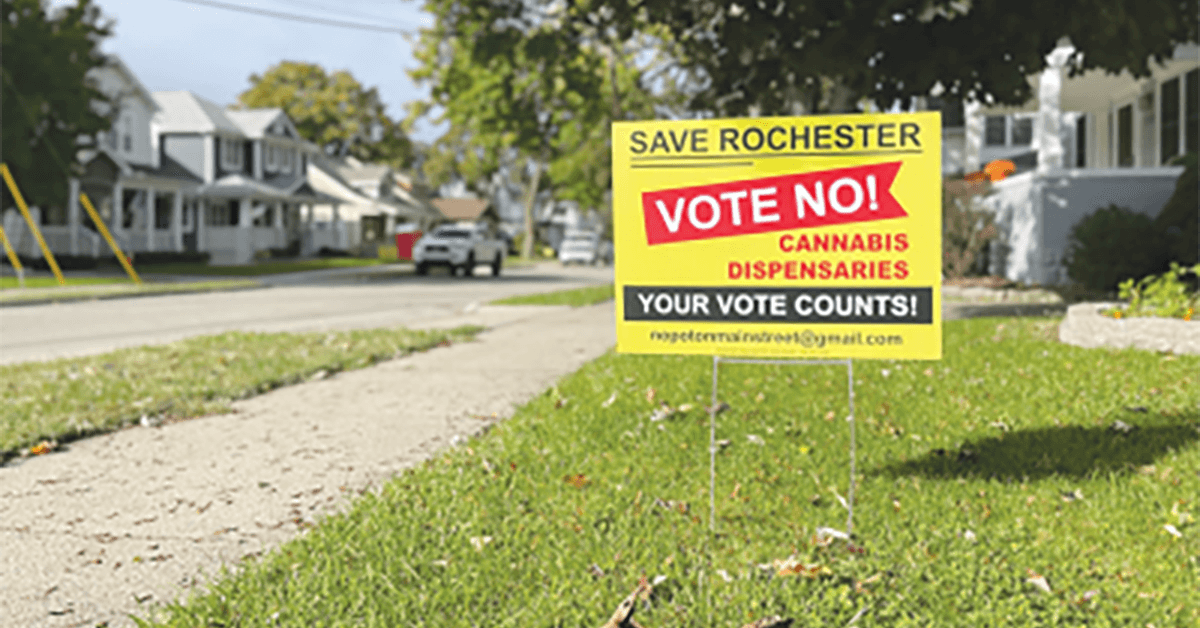Marine City Commission Delays Vote on Cannabis Facility Regulations

The Marine City Commission has postponed its decision on the adoption of a new ordinance aimed at regulating adult-use cannabis facilities within the city limits. The delay, announced during their February 15th meeting, marks another setback in the city's efforts to finalize regulations surrounding the establishment of cannabis businesses.
In the fall, the commission had successfully passed the first reading of an ordinance designed to introduce adult-use cannabis facilities to Marine City. This initial proposal set forth strict zoning requirements, demanding a 1,000-foot buffer zone from various sensitive areas, including residential zones, schools, churches, rehabilitation centers, child care facilities, and similar establishments.
However, complications arose when City Manager Scott Adkins revealed issues with the proposed zoning restrictions. Initially, a map outlining a 1,000-foot buffer zone left no viable locations for cannabis facilities. Subsequent adjustments to reduce the buffer zone to 750 and then 500 feet did little to alleviate the problem, eventually identifying only two potential sites for such establishments.
During a January 18th meeting, the commission agreed to reconsider the ordinance with the reduced 500-foot buffer, prompting a review and adjustment of the language concerning zoning requirements. Public opinion on the matter has been mixed, with a majority expressing opposition to the introduction of cannabis facilities in Marine City, while others, including former Commissioner Michael Hilferink, have voiced support.
The recent discussion highlighted Commissioner Brian Ross's suggestion to align the city's zoning restrictions more closely with state recommendations, which primarily focus on avoiding exclusively residential areas and maintaining a 1,000-foot distance from K-12 schools. Ross proposed that by adhering to these state guidelines, Marine City could demonstrate compliance while still imposing additional local restrictions.
City Attorney Robert Davis emphasized the importance of reviewing the final mapping to ensure the ordinance's effectiveness and legality. He also noted that there is no urgency to finalize the ordinance, advocating for a thorough review process to ensure the community's needs and legal requirements are adequately addressed.
The commission decided to further explore zoning possibilities by working with the county's geographic information system service to create a map that incorporates the state's recommendations. This decision was approved by a vote of 6-1, with Commissioner William Klaassen dissenting. The outcome of this initiative will be discussed in future meetings, as Marine City continues to navigate the complex process of integrating adult-use cannabis businesses into its community framework.
A Night of Magic and Marijuana: Smokus Pocus Comes to East Lansing

The city of East Lansing is set to host an unprecedented event that promises to merge the enchanting world of magic with the vibrant culture of cannabis. On Friday, March 8th, the Albert A. White Performing Arts Theater at 819 Abbot Road will transform into a haven for magic enthusiasts and cannabis connoisseurs alike, as it presents "Smokus Pocus: A 420 Magic Show."
Smokus Pocus has garnered acclaim from notable publications, with Las Vegas Magazine guaranteeing it "to blow your mind!" and HuffPost lauding it as "The Best!" This unique performance, led by the talented magician and cannabis aficionado Ben Zabin, invites audiences to experience a night of "Dank Debauchery" filled with innovative magic that seamlessly intertwines with cannabis culture.
The show, described as the "World's Dopest Magic Show," offers an evening where the impossible becomes possible. Attendees will witness jars of bud appear out of thin air, lighters animate with a life of their own, and bongs distort reality in ways that will leave viewers questioning the fabric of their perception. It's a spectacle designed to captivate both those who partake in cannabis and those who prefer to stay sober, ensuring an unforgettable experience for all.
Smokus Pocus has enjoyed sold-out performances across North America, including extended runs in Brooklyn and Las Vegas, thanks to its compelling blend of tokes, jokes, and magical tricks. The show's reputation for delivering a mind-blowing night out is well-earned, with each act crafted to astonish and amuse, leaving audiences marveling at the sheer creativity and skill on display.
For those interested in attending, the event will take place from 8:00 to 9:30 pm EST. Tickets are priced at $35 each, or $130 for a group of four. An early-bird special, available until March 1st, offers reduced pricing at $30 for individual tickets or $110 for a group of four. Premium seating options are also available for $45 per ticket.
To secure your spot at this magical and cannabis-infused extravaganza, or for more information, visit the Smokus Pocus official website at SmokusPocus.com. Prepare to be immersed in a world where caricatures spring to life, objects disappear and reappear in the most unexpected places, and the power of magic meets the culture of cannabis in a celebration unlike any other.
Agrify and PDS Ventures Forge Innovative Cannabis Extraction Partnership

Agrify Corporation (NASDAQ: AGFY), a trailblazer in providing state-of-the-art cultivation and extraction solutions, has recently unveiled its groundbreaking partnership with Michigan-based PDS Ventures, LLC, a licensed cannabis operator. This collaboration marks a significant milestone, introducing Agrify's innovative multi-year managed extraction services. This unique service model is designed to redefine the cannabis industry's approach to extraction and post-processing, offering an unparalleled level of support and expertise to operators.
The essence of this partnership lies in Agrify's managed services program, a pioneering initiative in the cannabis sector. Unlike traditional business models that focus solely on equipment sales, Agrify's approach integrates leasing cutting-edge extraction and post-processing equipment with comprehensive operational support. This includes the provision of a dedicated customer success specialist who will be stationed on-site at PDS Ventures' facility. Their role is to offer hands-on guidance, training, and ensure adherence to best practices and standard operating procedures, all aimed at optimizing extraction operations.
This collaboration is not just about enhancing operational efficiency; it's about building a synergistic relationship that boosts the average lifetime value of Agrify's clientele. By transitioning from a simple vendor-client relationship to a more integrated partnership, Agrify secures a position to generate multi-year high-margin revenue streams. In turn, operators like PDS Ventures benefit from a complete package of professional design, support, installation, and ongoing training, all of which are crucial for achieving maximum yield and superior product quality.
The contract between Agrify and PDS Ventures is structured around a novel financial model, combining a monthly production success fee with a management fee, based on the actual output of finished product. This arrangement underscores the confidence in this partnership's potential to generate up to $2 million for Agrify over the lifespan of the agreement.
At the heart of this partnership is a commitment to leveraging the latest in extraction technology to ensure the production of high-quality cannabis products. PDS Ventures will utilize Agrify's PX10 Hydrocarbon Extraction System, Hydrocarbon Distillation Unit, and other advanced systems, setting new standards for product quality and operational efficiency in the industry.
This strategic alliance represents more than just a business transaction; it's a significant leap towards fostering innovation and quality in the cannabis extraction domain. By combining Agrify's technological prowess with PDS Ventures' operational capabilities, this partnership is poised to elevate the standards of cannabis products available to consumers, ensuring potency, purity, and consistency.
The broader implications of this partnership extend well beyond its immediate benefits. It signifies a pivotal shift in the industry's landscape, emphasizing the importance of collaborative efforts and technological advancement as key drivers of growth. This managed service model, highlighting long-term engagement and mutual success, could very well become the new benchmark for business operations within the cannabis sector.
As the industry continues to evolve, the partnership between Agrify and PDS Ventures stands as a testament to the power of innovation and collaboration. It not only paves the way for the future of cannabis extraction but also serves as a beacon of hope for the entire industry, demonstrating the immense potential that lies in embracing new technologies and business models.
For those interested in the financial side of the cannabis industry, an exclusive opportunity awaits. By signing up through our Robinhood referral link, you might secure a free portion of Agrify stock, making you a part of the groundbreaking journey of companies like Agrify in the cannabis sector. Explore this chance and potentially start your investment journey in the burgeoning cannabis market.
Detroit Community Rallies Against Sale of Tobacco and Cannabis to Minors

In Detroit, a rising wave of concern is sweeping through the community as allegations surface about smoke shops selling tobacco and cannabis products to minors. This issue has prompted local residents to demand more stringent measures to prevent such practices, following the recent shutdown of a local shop accused of these illegal sales. The closure of this establishment, however, has sparked a broader debate on the responsibility of retailers and the need for community action to protect the youth.
The spark for this outcry was ignited on Detroit's east side, where community members, led by local ministers and concerned citizens, gathered to protest. They argue that shutting down a single business is insufficient to address the systemic problem of underage sales of tobacco and cannabis. The protest was not just a stand against one errant retailer but a call to action for the city to enforce stricter regulations and oversight on all businesses that flout the law by selling harmful substances to children.
At the heart of the protest was the proximity of these shops to local schools, highlighting the ease with which students could access tobacco and illegal cannabis products. This accessibility raises significant concerns about the health and safety of Detroit's youth, particularly given reports of other shops in the city engaging in similar practices. One alarming revelation was a business on the west side accused of selling vape products to children as young as 11 and 12 years old, according to local school principals and students.
The community's frustration is palpable, with protesters emphasizing that this issue is not isolated to one location or age group but is a citywide concern that affects children across Detroit. The blatant disregard for the well-being of young people, especially young Black lives, in these communities has been called out as unacceptable. Protesters argue that such predatory practices would not be tolerated in the perpetrators' own communities and should not be allowed to continue in Detroit.
The rallying cry from the east side of Detroit is clear: the time for change is now. The community's stand against the sale of tobacco and illegal cannabis to minors is not just about law enforcement but about taking collective responsibility for the safety and future of their children. This issue highlights a critical need for more robust regulations, vigilant enforcement, and community engagement to ensure that businesses cannot profit at the expense of the health and safety of minors.
Rochester Voters Stand Firm Against Recreational Marijuana Sales

In a decisive move reflecting community sentiment, Rochester voters recently turned down two ballot initiatives aimed at introducing recreational marijuana sales within the city limits. This decision has spurred the Rochester City Council to evaluate its stance and prepare for any future proposals of a similar nature.
The inception of this issue dates back to November 2018 when Rochester, along with numerous Michigan cities, chose to opt-out of permitting marijuana sales following the state's legalization of the substance. The city council enacted an ordinance that unequivocally barred any marijuana-related businesses from operating in Rochester, exercising its rights under the Michigan Regulation and Taxation of Marihuana Act.
The narrative took a turn in 2023 when an external group, the Open Stores in Rochester Committee from Ingham County, mobilized to gather signatures for ballot measures to overturn the city's prohibition on cannabis sales. Despite their efforts, the community responded overwhelmingly in the November 7th, 2023, election, with 89% opposing the establishment of three recreational marijuana stores and 87% against a proposal for a licensing and application framework for such retailers.
In the aftermath, the City Council sought the advice of City Attorney Jeffrey Kragt on potential strategies to mitigate similar challenges in the future. During discussions, Mayor Stuart Bikson emphasized the council's commitment to due diligence and proactive planning to avoid being blindsided by future citizen-initiated legislation regarding marijuana sales.
Kragt outlined three primary options for the council's consideration: maintaining the status quo and keeping the ban on marijuana businesses, introducing specific legislation to regulate marijuana sales within designated areas of the city, or crafting a city-initiated ordinance or charter amendment for voter decision, offering an alternative to externally proposed regulations.
Despite these options, Kragt cautioned that there's no fail-safe method to prevent future ballot initiatives by external groups aiming to alter the city's marijuana policies. This reality led the council to decide against taking immediate action, with Councilwoman Debbie Jones and Marilyn Trent expressing their trust in the community's clear stance against marijuana sales and the potential confusion additional ballots might cause.
Mayor Pro Tem Nancy Salvia reflected on the strong message sent by Rochester residents, contrasting it with the significant sales figures from Michigan's legal marijuana market in 2023. The council, she stated, aims to uphold the current prohibitions while remaining vigilant about the possibility of future proposals.
In conclusion, the city's leadership, buoyed by a resolute community vote, opts to stand by its existing regulations on marijuana businesses. However, they remain aware of the evolving landscape and the likelihood of revisiting this issue as external pressures persist. City Attorney Kragt assured ongoing vigilance and communication with the council regarding any new developments.
CannaJamin Festival: A Weekend of Music, Cannabis Culture, and Community in Standish, MI

The Wild Wind Sanctuary in Standish, Michigan, is gearing up to host a vibrant celebration of cannabis culture and music, named CannaJamin. This event, scheduled to start on Thursday, June 13th, at 12pm EDT, promises a four-day weekend filled with a diverse array of live music, engaging activities, and a plethora of vendors showcasing their unique products.
Organized by Terp N Time Genetics, CannaJamin is designed for individuals above the age of 21 and aims to bring together the cannabis community for a festival that transcends musical genres. Attendees can expect a lineup of talented local musicians across the weekend, alongside an exciting mix of vendors offering everything from epoxy and resin products to custom jewelry, clothing, handmade items, glassware, and custom rugs.
In addition to the musical performances and shopping opportunities, CannaJamin will feature a range of activities designed to entertain and engage, including 420 bingo, cornhole, giant Jenga, and Connect 4. Culinary delights will be available from Two Kitchens & A Jerk, offering fresh grilled food, and Connoisseur Conncessions, serving up fresh deep-fried treats. For those looking to immerse themselves fully in the festival experience, camping options are available, though spaces are limited.
The festival will also host a small caregivers cup, hinting at the possibility of this becoming an annual highlight. With sounds provided by LogSquared Sounds and Lasers and lighting by VIP Southbend, CannaJamin is set to be a sensory delight.
The musical lineup includes a diverse range of artists set to perform across the four days:
- Thursday: Performances by Saint Beefus, Brother Mikey, Mando McPickin, Moroni Lane Music, NEO Drum, Mikel James Watkins, White Marley, King Reid, Dreamz The Artist, Primal Moon.
- Friday: Jarome Allen, T. Schwab, DJ Royalty, Psychorot, Panda T.
- Saturday: Kristine Goodwin, Among The Essence, Spencer Corpus Music, Altered Thoughts, JDs RoadHaus Band, Jack Elliot Music, Sonic Honey, Katie Hinote Trio, SoZeN, Morta LYfe, Brad Corpus Music, 3mma Leigh33, 45 Hollow.
- Sunday: Micheal Root Music, Vella St, 414, Mike Griffin, Jackstand, Saint B, N.Y.T.E.
Tickets for this immersive experience are available on Eventbrite starting February 1st. CannaJamin offers a unique opportunity for the cannabis community and music enthusiasts alike to come together and celebrate in a welcoming, inclusive environment.


 Helpful Links
Helpful Links